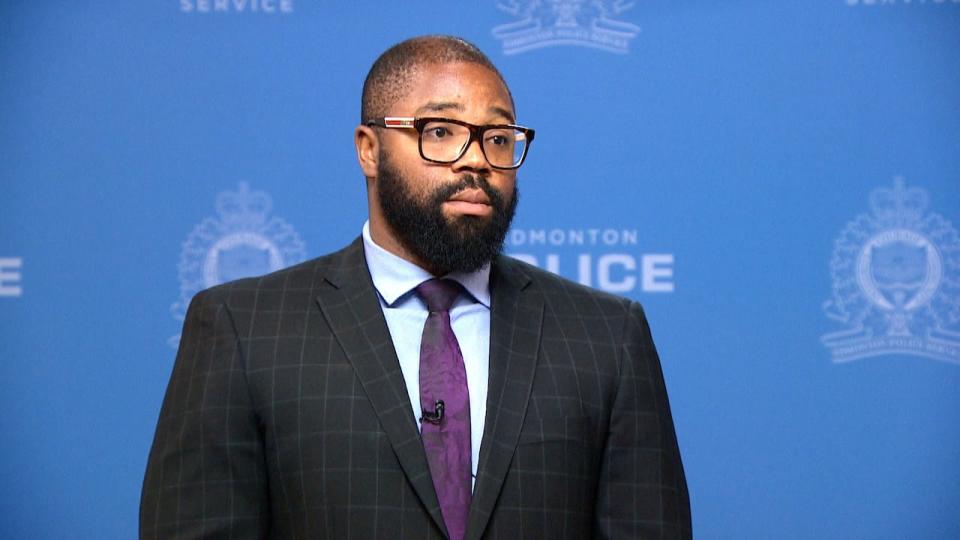A retired Edmonton police officer was questioned in front of the Alberta Human Rights Tribunal this week, about his handling of a call that’s now the subject of a gender discrimination complaint.
The tribunal hearing concluded Thursday. Evidence was presented over several days in the last five months.
The incident that prompted the complaint occurred more than five years ago, and a decision is still to come.
“To this day I don’t understand why misgendering is so problematic,” David Schening, the retired officer, said during Wednesday’s hearing.
Schening was working as an emergency communications officer — a civilian role with the Edmonton Police Service — on the night of April 11, 2019, when he took a call from Marni Panas. She had dialled 911 because Panas was worried her friend, who she identified to Schening as a trans woman, was in danger.
During the call, Schening made comments suggesting Panas’s friend was a sex worker, which the tribunal heard wasn’t the case.
Transcripts of the call presented to the tribunal show the conversation escalated. Schening misgendered Panas as “sir,” and when she corrected him, he replied, “We’re on the phone, buddy. How am I supposed to know that? You think I can see you?”
Panas asked whether he understood how problematic it is to assume she’s a man. He replied, “Actually, no, I don’t,” later adding, “You’re very, very sensitive to a word.”
Adam Sopka, counsel to the director of the Alberta Human Rights Commission, asked Schening Wednesday whether he was aware of the concept of misgendering at the time of the call in 2019. Schening said no.
“Out of respect … we want to get the right gender, we want to deal with what we’ve got to deal with and move on,” he said.
“I still don’t appreciate why a word is so sensitive to someone. I’ve been called names on the street my whole career — makes this look like a child at kindergarten thing. And it’s just water off my back. I don’t worry about it.”
Multiple incidents make for ‘serious’ violation: lawyer
Panas filed her complaint in 2020, alleging EPS violated her rights under the protected grounds of gender, gender expression and gender identity.
Schening was the second dispatcher Panas spoke to when she called 911. The first also misgendered her as “sir” three times, including once after she corrected him.
Correspondence from EPS that Panas received, after filing a freedom of information request related to the calls, subsequently referred to her again as “sir” and “Mr.” Marni Panas.
Enyinnah Okere, chief operating officer of the Office of the Chief at EPS, gave evidence that, when he learned about that issue, he immediately directed that correspondence default to a person’s full name rather than gendered honourifics — a change now in effect.

Enyinnah Okere said he ordered changes as soon as he heard about Panas receiving EPS correspondence that misgendered her. (Trevor Wilson/CBC)
Sopka argued Thursday that Panas faced continuous adverse treatment due to her gender identity. The incidents, taken together, add up to a serious violation of the Alberta Human Rights Act, he said.
“After Ms. Panas clearly stated her friend was a trans person and thus might be at risk, Mr. Schening then stated, ‘Well, they shouldn’t be in that profession, now, should they?'” Sopka said.
“Based on the timing of the statement, it is submitted that the reason Mr. Schening concluded Ms. Panas’s friend was a sex worker is because she was a trans person.”
Schening gave evidence that he made the connection to the sex trade because he spent seven years working on sex-trafficking investigations in the EPS vice unit.
He only knew of the concept of a “safety check” after meeting someone in the context of prostitution, because sex workers are at higher risk of violence, Schening said. That immediately came to mind when Panas talked about being a “safety person” for a friend on a date.
LISTEN | An excerpt of the call between Marni Panas and EPS employee:
He said he regretted making the “profession” comment.
“I was trying to flesh out from my experience, was this an emergency or not? That was an inquiring statement that should have been a question,” Schening told the tribunal.
Sopka argued that Schening calling Panas “buddy” also constituted misgendering, as it’s a term with gendered connotations.
Sopka asked Schening whether he would call a cisgender woman “buddy” during a confrontation.
“That’s a good question,” Schening responded. “I don’t know. Probably not.”
Schening eventually took Panas’s friend’s name and the address she had gone to, and placed a welfare check for dispatch. An officer was able to contact Panas’s friend a short time later and verified she was OK.
Misgendering ‘inadvertent,’ police lawyer argues
EPS lawyer Derek Cranna said it’s important to note that Panas wasn’t denied the service she was seeking from police.
“While it may not be appropriate to label somebody as ‘sir’ or ‘ma’am’ simply by the sound of their voice, both [emergency operators] did not mean any disrespect by doing so,” Cranna said.
“In our submission, these examples of misgendering were inadvertent and they were slips that members apologized for in the course of the phone calls that they occurred in.”
Cranna said Schening’s use of the word “buddy” wasn’t appropriate, but also didn’t come with any malicious intent.
An EPS human resources investigation concluded that Schening’s conduct was “unprofessional and impolite at times” on the call.
According to evidence presented to the tribunal, he met with a supervisor to discuss how he should “stay on script when evaluating calls rather than going off script and giving the caller advice and opinions.”
The investigation concluded there was no “maliciousness or intentional bias” in Schening’s actions. Aside from a supervisor speaking with him, no further action was recommended.
If the tribunal decides that Panas’s complaint has merit, different remedies can be ordered, including compensation.
Sopka said up to $30,000 in general damages would be appropriate, and the tribunal may also consider ordering EPS to pursue additional training for employees.
“I note in particular that Mr. Schening still did not appreciate why misgendering a trans person could be traumatic or why someone would be sensitive to that,” Sopka said.

